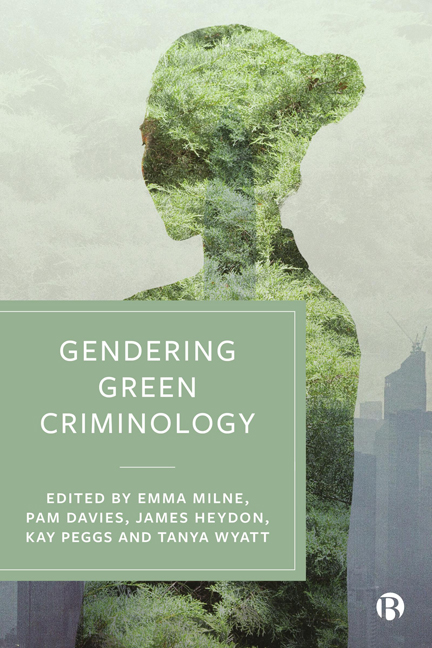10 - The Green Road Project and Women’s Green Victimisation in Turkey
Published online by Cambridge University Press: 28 March 2024
Summary
Introduction
There have been criticisms that green criminology neglects women's green victimisation (WGV); and feminist criminology has paid little attention to the victimisation of women by green crimes (Lynch, 2018). It is argued that ‘the specific “green victimization experiences” varies across types/groups of victims, as well as across individuals in the same victim group’ (Lynch, 2018: 406). For example, environmental toxins affect children and adults differently. ‘Illustrating the importance of gender, medical studies of toxic exposure also indicate that women are affected differently than men’ (Lynch, 2018: 406). Taking gender inequalities into consideration, feminist green criminology seeks to address this ignorance and offers an understanding of WGV and conceptualises WGV as part of the broader social structure of gender relationships (Lynch, 2018). To understand the nature and extent of victimisation, feminist green criminology provides the needed empathy towards women victims of green crime.
One instance where such an approach may provide valuable insight is in the case of Turkey. Paving the way for transportation of minerals and other extracted sources between Turkey, Russia and Europe, in the Eastern Black Sea (EBS) region of Turkey, the controversial 2,600km ‘Green Road’ is planned to be constructed. The project also aims to connect tourism centres throughout the highlands of the provinces of Artvin, Rize, Trabzon, Giresun, Ordu, Gumushane, Bayburt and Samsun in the EBS region; all previously protected as conservation areas and public land. Environmentalists and people in this region are greatly concerned that the project may have a potentially devastating impact on the environment; local people are under threats of green crime from extractive industries. There are fears that the ‘Green Road’ will cause erosion, forest loss, habitat fragmentation, stream pollution and other ecological destruction. The project also threatens the traditional, seasonal migrations of people who bring their livestock up into the highland pastures to graze each summer (Bayraktar, 2022). These devastating developments cause WGV and put women's livelihoods at risk, ultimately forcibly removing them from their traditional living spaces (Akay, 2020).
Relevant studies in the Turkish context have so far focused only on environmental politics, local opposition movements (Eryılmaz, 2016; Erensu, 2018), climate justice, energy politics (Kaya, 2016; Turhan et al, 2016; Mazlum, 2017; Turhan, 2017), eco-feminism (Seckin, 2016) and other similar issues.
- Type
- Chapter
- Information
- Gendering Green Criminology , pp. 187 - 204Publisher: Bristol University PressPrint publication year: 2023

